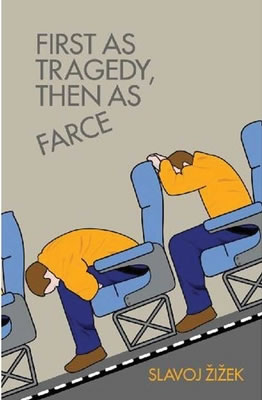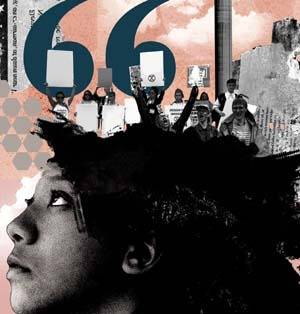 There is no doubt that Slavoj Žižek churns it out, and the Slovenian politico-psychoanalytic-popculture-philosopher runs a constant risk of spreading himself decidedly thin. There are even two films helmed by the great man, appropriately divided between the brilliant Pervert’s Guide to Cinema and the shoddy Žižek! Sometimes you wonder if a given book has been generated by an instant Žižek Generator, programmed to combine exact proportions of old Communist-era or vaguely peasant jokes, meditations on universalism and the virtues of St Paul, readings of Hitchcock or M. Night Shyamalan, and neo-Marxist calls to arms.
There is no doubt that Slavoj Žižek churns it out, and the Slovenian politico-psychoanalytic-popculture-philosopher runs a constant risk of spreading himself decidedly thin. There are even two films helmed by the great man, appropriately divided between the brilliant Pervert’s Guide to Cinema and the shoddy Žižek! Sometimes you wonder if a given book has been generated by an instant Žižek Generator, programmed to combine exact proportions of old Communist-era or vaguely peasant jokes, meditations on universalism and the virtues of St Paul, readings of Hitchcock or M. Night Shyamalan, and neo-Marxist calls to arms.
You can roughly divide his output between quick potboilers and clearly rather more careful, large-scale “canonical” works such as The Sublime Object of Ideology, The Parallax View and the recent In Defence of Lost Causes – wherein the call for a revived Communism led the New Republic to call him “the most dangerous philosopher in the West” – a phrase which finds its way on to the cover of this short, polemical book on the financial crisis.
As a pot-boiler, a short book rushed out to coincide with a crisis, this should in theory be put in the category of non-essential Žižek. However, when an event is of sufficiently spectacular importance, Žižek has been known to raise his game somewhat – Welcome To The Desert Of The Real for instance, his response to the September 11 attacks, was a brilliantly sharp and unnerving – and prescient – analysis of geopolitical psychoses. So too with First As Tragedy, Then As Farce, where, despite some familiar gags (fans may or may not be pleased that the rapist’s dusty testicles make a reappearance) and a couple of less relevant digressions, the polemic stays ferociously sharp and focused. The target, as ever, is liberalism, with the “tragedy” being the response to 9/11, where core liberal beliefs were casually jettisoned (“pro-war liberals” justifying pre-emptive war and torture), followed by the “farce” of the 2008 financial crash, where their economic philosophy was incapable of explaining the chaotic collapse of neoliberalism’s intricate financial architecture.
The analysis here is far more astute than the alternately guilt-ridden and baffled responses from the official “left”, whose fantasies of a nicer capitalism are mercilessly debunked here. Žižek notes in an especially pungent passage how in 2008 the usual dithering of international politics was suddenly abandoned, revealing our real priorities – “saving endangered species, saving the planet from global warming, saving AIDS patients and those dying for lack of funds for expensive treatments, saving the starving children ... all this can wait a little bit. The call save the banks [meant that] sums of an unbelievable magnitude had to be found immediately.”
The other tragedy/farce is that the apologists for capitalism have found themselves making the same excuses that some socialists made upon the collapse of Stalinism in 1989. Žižek ends his book with a familiar call for a renewed Communism – but in the current context, it suddenly seems worth taking seriously.
First As Tragedy, Then As Farce is published by Verso

